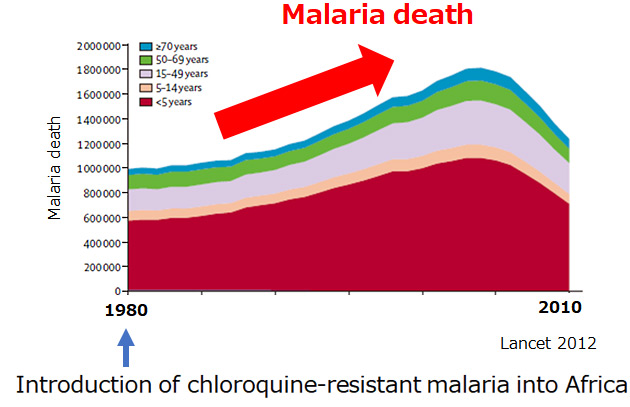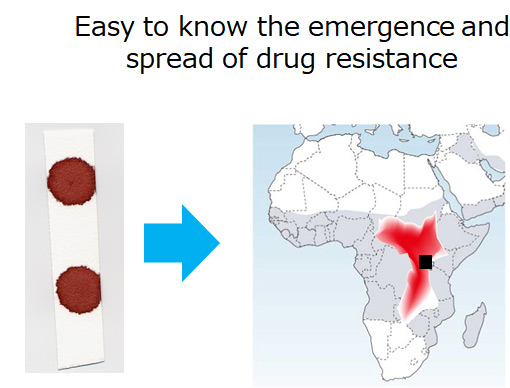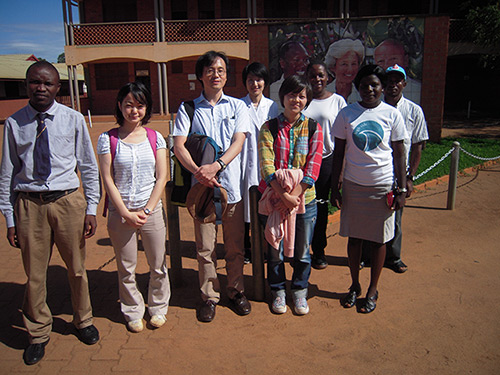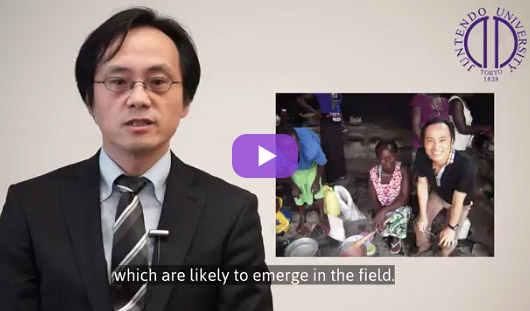Research Activities
The research of the Department of Tropical Medicine and Parasitology
Toshihiro Mita
Professor and Principle Investigator
Department of Tropical Medicine and Parasitology
Juntendo University School of Medicine
Toshihiro Mita and colleagues are conducting research on tropical diseases, in particular malaria, which in addition to tuberculosis and HIV aids, is one of the three major infectious diseases in the world
 Drug resistance is the most serious problem related to malaria. In 1979, protozoa appeared in Africa that were resistant to a drug called chloroquine. Ninety percent of all malaria patients exist in Africa, and deaths caused by malaria have increased due to the spread of drug resistant protozoa.
Drug resistance is the most serious problem related to malaria. In 1979, protozoa appeared in Africa that were resistant to a drug called chloroquine. Ninety percent of all malaria patients exist in Africa, and deaths caused by malaria have increased due to the spread of drug resistant protozoa.
Drug resistance will definitely lead to increases in deaths due to malaria. So Mita and his group are working resolving issues related to drug resistance is the most important task for countering malaria.
The first characteristic of the Mita Lab is that they are implementing high quality studies at actual sites where malaria is prevalent. Extensive know-how is necessary to study malaria drug resistance at actual sites. The Mita Lab has accumulated such know-how over the past 10 years.
Currently, there are field lab systems set up in the Uganda Republic of Africa and Papua New Guinea in the Pacific, to gain fast and up to date information about drug-resistance in order to obtain important specimens.
Notably, the members of the Mita Lab were the first group in the world to report the appearance in Africa of protozoa resistant to first-line drugs of malaria called artemisinin.
Second, the Mita Lab is strongly promoting applied research leading to the development of new technologies.
 “Epidemiological research is important to accurately understand current problems,” says Mita. “So constantly ask ourselves, "How do we solve them?"”“Epidemiological research is important to accurately understand current problems,” says Mita. “So constantly ask ourselves, "How do we solve them?"”
“Epidemiological research is important to accurately understand current problems,” says Mita. “So constantly ask ourselves, "How do we solve them?"”“Epidemiological research is important to accurately understand current problems,” says Mita. “So constantly ask ourselves, "How do we solve them?"”
Regarding artemisinin-resistant protozoa in Africa, Mita and colleagues are developing genetic markers that can quickly and accurately diagnose tolerance.
There are many places where there is no electricity and water in malaria endemic areas, and it is not easy to monitor the appearance and spread of resistance protozoa. With the development of an appropriate genetic marker, just by storing a drop of blood in filter paper, it becomes possible to acquire this information.
Furthermore, Mita and his team are promoting research towards building a system for predicting gene mutations in drug-resistant protozoa, which are likely to emerge in the field.
“As a tool, we produced malaria parasites that evolved about 40 times faster by genome editing and named them mutator malaria,” explains Mita. “We have already succeeded in laboratory isolation of resistant protozoa by incubating this mutator malaria for several weeks in the presence of certain antimalarial drugs.”

If it is possible to identify genes involved in tolerance, then it may be possible to produce genetic markers that quickly find drug-resistant protozoa in the field that emerge in the future.
So, all members of the Mita Lab go to malaria endemic areas to see first-hand the needs of patients, thereby making it possible to conduct high-impact malaria studies day and night, “by seeing both trees and forests”.
“I would like to continue innovative, scientific applied research to lead to contribute to resolving problems related to malaria drug resistance,” says Mita.
Link
- Researcher Profile
https://www.juntendo.ac.jp/english/research/mita_toshihiro.html - Department of Molecular and Cellular Parasitology
https://www.juntendo.ac.jp/english/department/gra/parasitology/ - Press Releases
https://www.juntendo.ac.jp/english/research/press_release20180423.html

